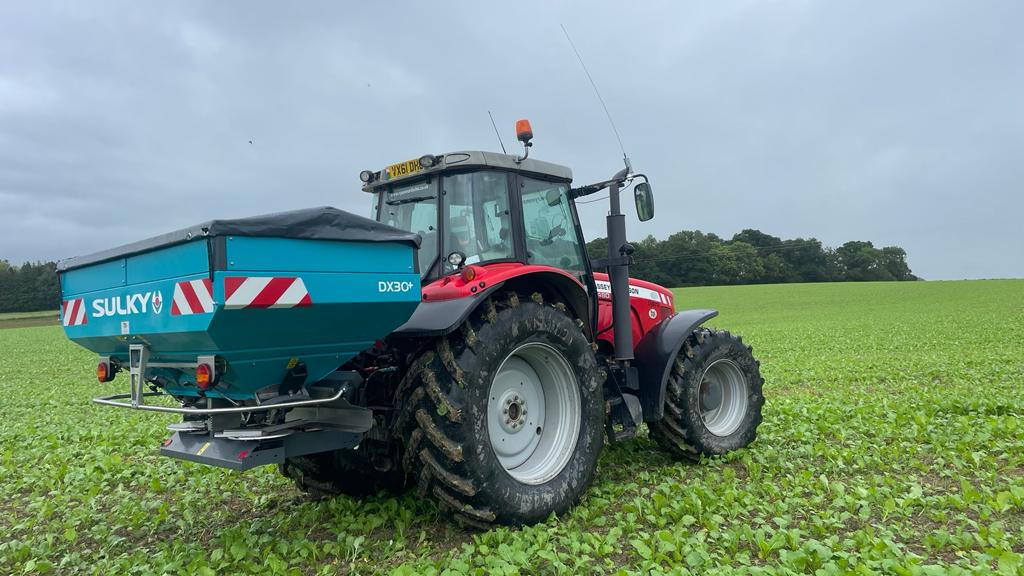New Tigo Joins the Newport Fendt Family
We visited Thomas Gilman and Adam Taylor from S M Gilman & Partners in Newport, Shropshire and spoke to them about their new and older model Fendt Tractors and New Fendt Tigo forage wagon.
The farm is around 700 acres, made up of dairy and beef cattle, as well as around 250 acres of wheat grown each year and sold off farm. Adam and Thomas explained that there are around 250 pedigree Friesian Holsteins milking on Lely robots, alongside a beef herd of 150. They also have space for some sheep to winter graze on turnips, as well as doing a bit of contracting too.
Grass and maize is grown for silage to feed their own livestock, as they are housed all year round.
The farm has recently bought a Fendt Tigo 65 VR forage wagon to help with the grass silage season, and as a trailer for the maize harvest. Thomas said, ‘now was the right time to buy one as we needed to replace the current old forage harvester and silage trailers, so we decided to try a chopper and trailer in one.’
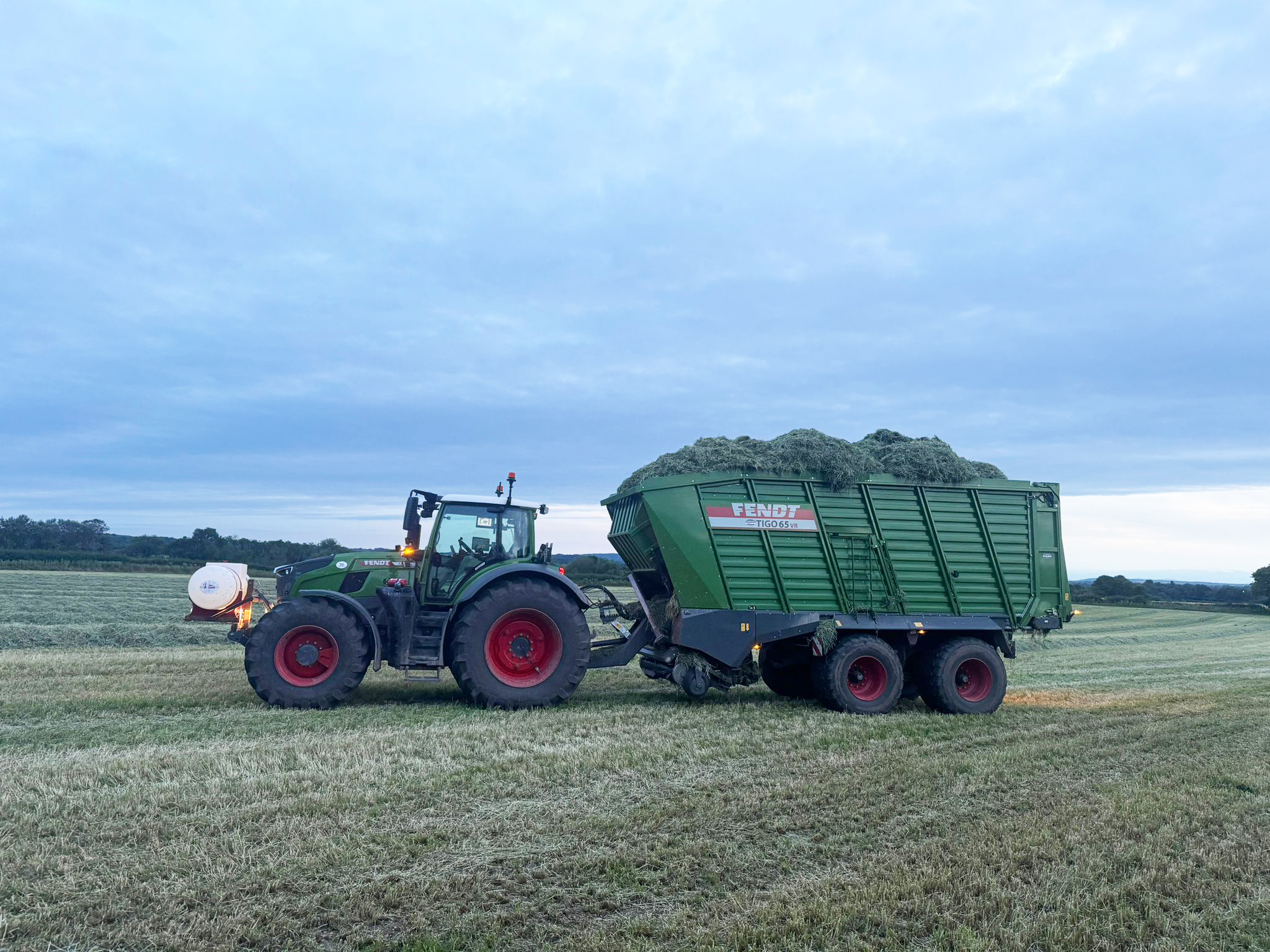
Adam and Thomas were impressed with the speed at which the forage wagon works, reporting that it is lightweight and compact compared to other forage wagons of the same capacity. Adam added, ‘you know when you have a full load on board, but having the moveable bulkhead that compacts the grass, makes a big load with a smaller sized wagon compared to other wagons. Other forage wagons are at least 1m longer for the same capacity.’
Both Thomas and Adam agreed that using the Fendt Tigo forage wagon is a different way of working. Before they had it, they would use their large tractor for mowing for a day, and then the next day do the chopping. They would then use their other tractors with trailers to collect the grass.
Now, in contrast, they can mow and chop in one day, or the following day depending on the conditions. They both agreed that it was a learning curve this year, but by the last cut of silage grass they had it all worked out. Due to the recent purchase of a Fendt 720 and a Fendt 728, they can keep one tractor mowing all day and the other following behind with the Fendt Tigo. Thomas added, ‘If the grass is a bit wet and needs a bit of time, then the Tigo can hang on and the mower can slow down a bit. We can get on quickly with how well it chops, and with the optional extra of the fast unloading feature, we can get unloaded quickly too.’
Having the Fendt Tigo means that less tractors are needed during silage season, and this gives Thomas and Adam efficiency and time savings, as well as releasing other tractors to do the normal day-to-day work.
As well as the Fendt Tigo, Thomas and Adam have three Fendt tractors. They bought a Fendt 312 in 2016 that does yard work, including feeding throughout the year. Earlier this year, they traded in one of their Fendt 828 tractors for a new Fendt 720, and then during silage season they had a Fendt 728 on demo from TR Machinery, and decided to keep it, trading in their other Fendt 828.
The Fendt 728 came with some optional extras that Thomas and Adam would not usually have, but Adam, who mostly drives the Fendt 728 would not be without them now! The additional features include vario grip, an additional screen that can retract into the roof space, RTK guidance, spools and worklights.
The Fendt 720 is used for ploughing, mowing, hedgecutting and for work that does not need as much horsepower as the Fendt 728 has. The Fendt 728 is used for drilling, pulling the Fendt Tigo and other heavier work when more horsepower is needed. Both Adam and Thomas agreed that the new tractors are better suited to their needs. They found that the two Fendt 828 tractors they had were almost too big and clumsy. Adam added, ‘We changed to slightly smaller tractors for agility and manoeuvrability. They are big enough to do the heavy jobs, when more horsepower is needed, and small enough to be able to move around for smaller jobs across the farm.
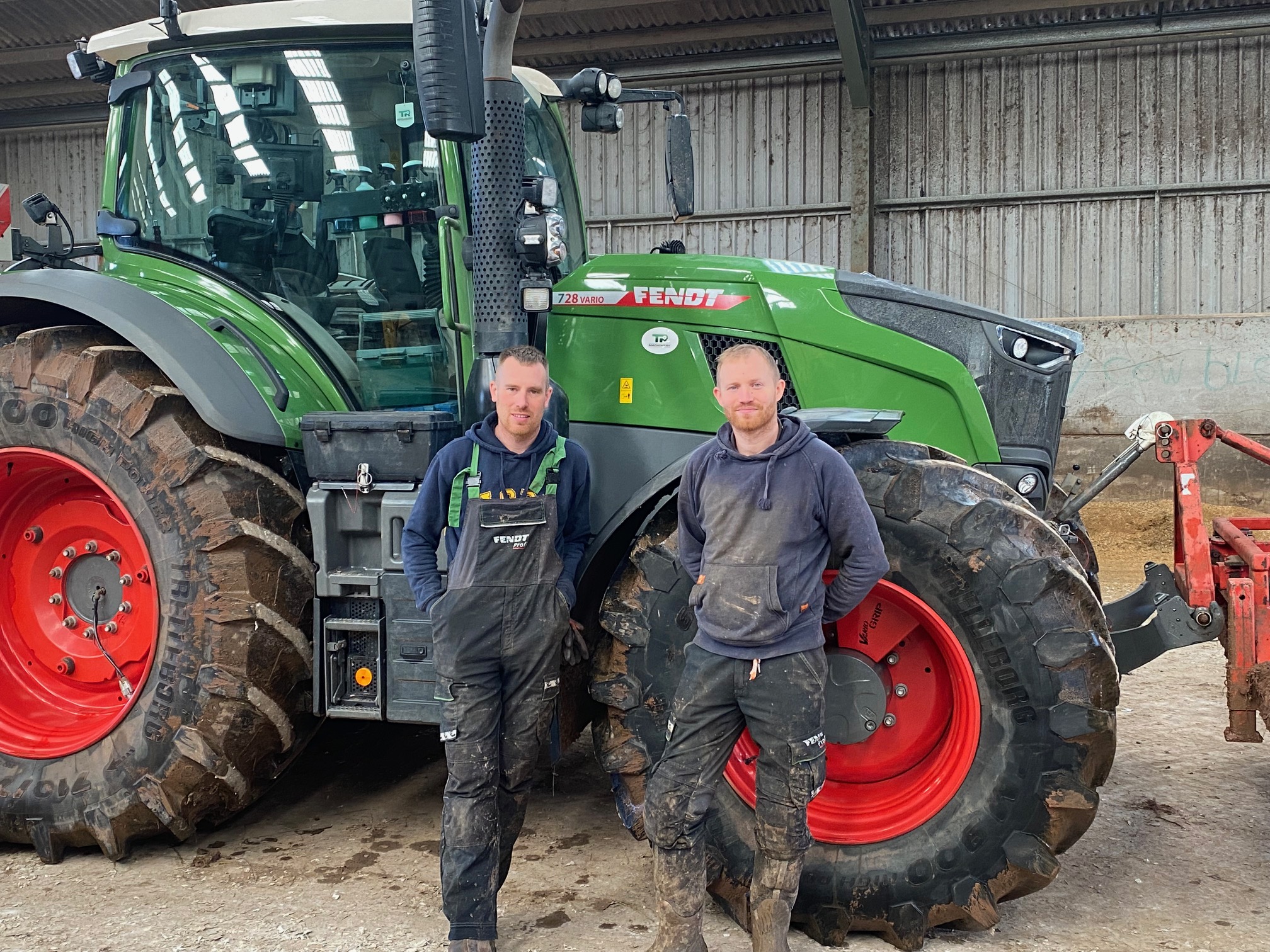
Thomas and Adam also commented on the fuel efficiency of both the Fendt 720 and the Fendt 728 compared to the Fendt 828s they previously owned. They noticed straight away with the Fendt 720 and its 1000 eco system, they used 40% less fuel when they ran the slurry pump system from it. Similarly, when the farm used the Fendt 728 on demo, fuel efficiency as one of the main things they looked for when they used it alongside the Fendt Tigo they had already bought. They found that the Fendt 728 used 15 litres less diesel an hour. Adam said, ‘This 30% saving on fuel made a big difference compared to running the Fendt 828 on the same work.’
The farm has been customers of RVW Pugh, and now its sister company, TR machinery for around 20 years. They find the service great and were very surprised that Sam Johnson, one of TR Machinery’s engineers came to them one Sunday night to fix a bolt on the Fendt Tigo. Adam added, ‘We were in the middle of making silage and we called TR Machinery about the bolt, expecting someone to come to the farm first thing in the morning. However, Sam was there within 2 hours, and fixed it straight away!’ As a result of this they only had 2 ½ hours of downtime.
Thomas and Adam have big plans for the farm going forward. They are currently building a new shed for the calves, and moving the beef herd to the same site as the dairy herd, as they are currently in different locations. They would also like to expand the contracting side of their business with the Fendt Tigo, and Thomas said, ‘If we got busier with silage contracting we would definitely buy another Fendt Tigo to support this.’
The support from sales people at TR Machinery has been great too, they have got to know a few people from the sales team over the years, and more recently Paul, Sales Support and Martyn, Sales Director through the demo Fendt 728 they had.
An Ideal Combine for the Jones Family
We recently spoke to Mike Jones about the Fendt IDEAL he purchased from TR Machinery.
Mike is a 5th generation farmer in Cheshire and works alongside his parents, sister, two farm workers and his 12 year old daughter, Daisy. They currently grow 300 acres of maize to feed their 1200 beef cattle, 600 Angus' and 600 British Blues.
Their other farm nearby is a water mill that produces flour curated from wheat grown in the fields surrounding the mill. The flour produced by the mill is used by hotels and bakeries around Chester and Manchester as well as their on-site cafe.
The Fendt IDEAL had been an upgrade from their previous combine, and when asked what makes the IDEAL stand out, Mike said, "The IDEAL is simply just a better machine in terms of its performance and how it drives. It's so easy to drive, my 12 year old daughter can do it!"
Due to the adveanced technology of the TI headland management system, the cutter bar height can be customised along with the reel position. Simply set where the field is and the combine will drive itself.
With past machines Mike said he felt the pressure more due to the UK weather being so unpredictable, meaning time is often of the essence. However, with the IDEAL, the need to dry crops didn't matter as much compared to previous combines which eased this pressure. This meant Mike didn't need to wait all day to dry the crops out, and avoids the need to work through the night.
Mike was more than impressed with the service he has recieved with the IDEAL combine. He said, "I couldn't praise the mechanics enough, Sam has been out a couple of Sundays to resolve any problems to ensure work is not disrupted for too long."
Mike noted that one of his favourite features was the ease of driving with a joystick instead of a steering wheel. No steering wheel also means increased visibility, which is needed when you have a 41 foot head on the front!
Another stand out feature for Mike is the fuel efficiency. Although it has a slightly larger tank, it would only need filling every 2-3 days which is a lot less demanding than his previous combines, which required filling once a day.
The family have been loyal customers of RVW Pugh and now its sister company, TR Machinery for roughly 20 years. After previous tractors were not meeting their demands, they had a Fendt on demo and never looked back. As well as the IDEAL, they have also have a Fendt 939 and two Fendt 828 tractors which they are very pleased with. Mike added, "They are great all-round tractors especially for working on the yard and road work such as moving manure and drilling."
Mike and the family have plans to grow their business further by expanding their maize crop to 500 acres to meet the high feeding demands of their cattle.
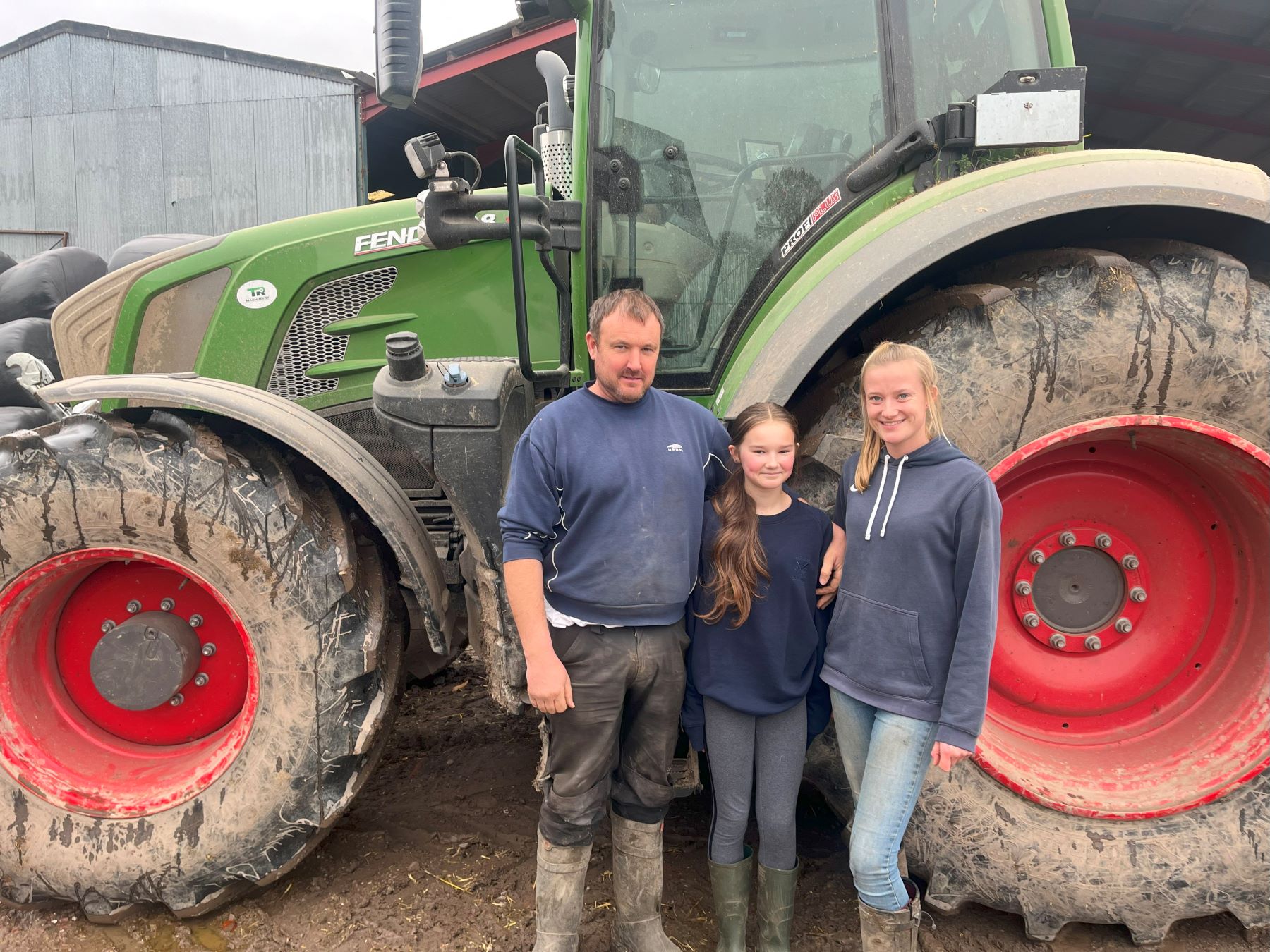
Mike with his daughter, Daisy and farm worker, Meg
Tracked Fendt offers economies of scale
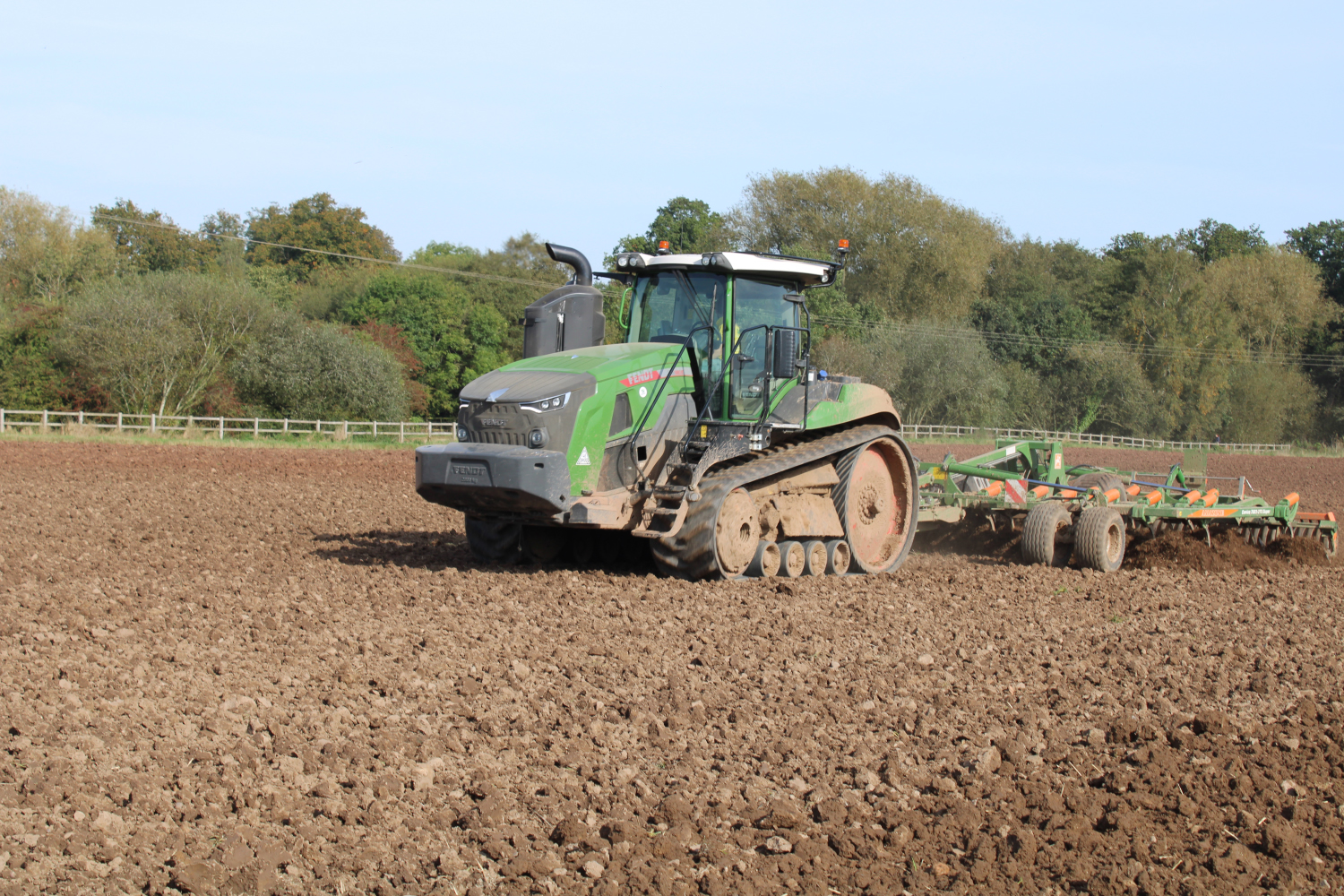
Weight and stability from a tractor that minimises ground compaction is a combination that Fendt’s 1156 MT provides with a stepless Vario drive that also brings new efficiencies to the crawler sector.
A broken rear axle on a wheeled tractor was the beginning of a long line of tracked machines for Sandy Walker at Ercall Park Farm in Shropshire. Following multiple Challenger machines, he invested in a 2023 Fendt 1156 Vario MT for operators Dan Deane and Tom Allison-Smith to cultivate the farm’s 2500 acres of cereals and potato land.
For the first time, Fendt crawlers like the 1156 MT now benefit from the Vario gearbox that operators have come to appreciate in the wheeled Fendt range. However, it is even more valuable in a machine with 564 horsepower.
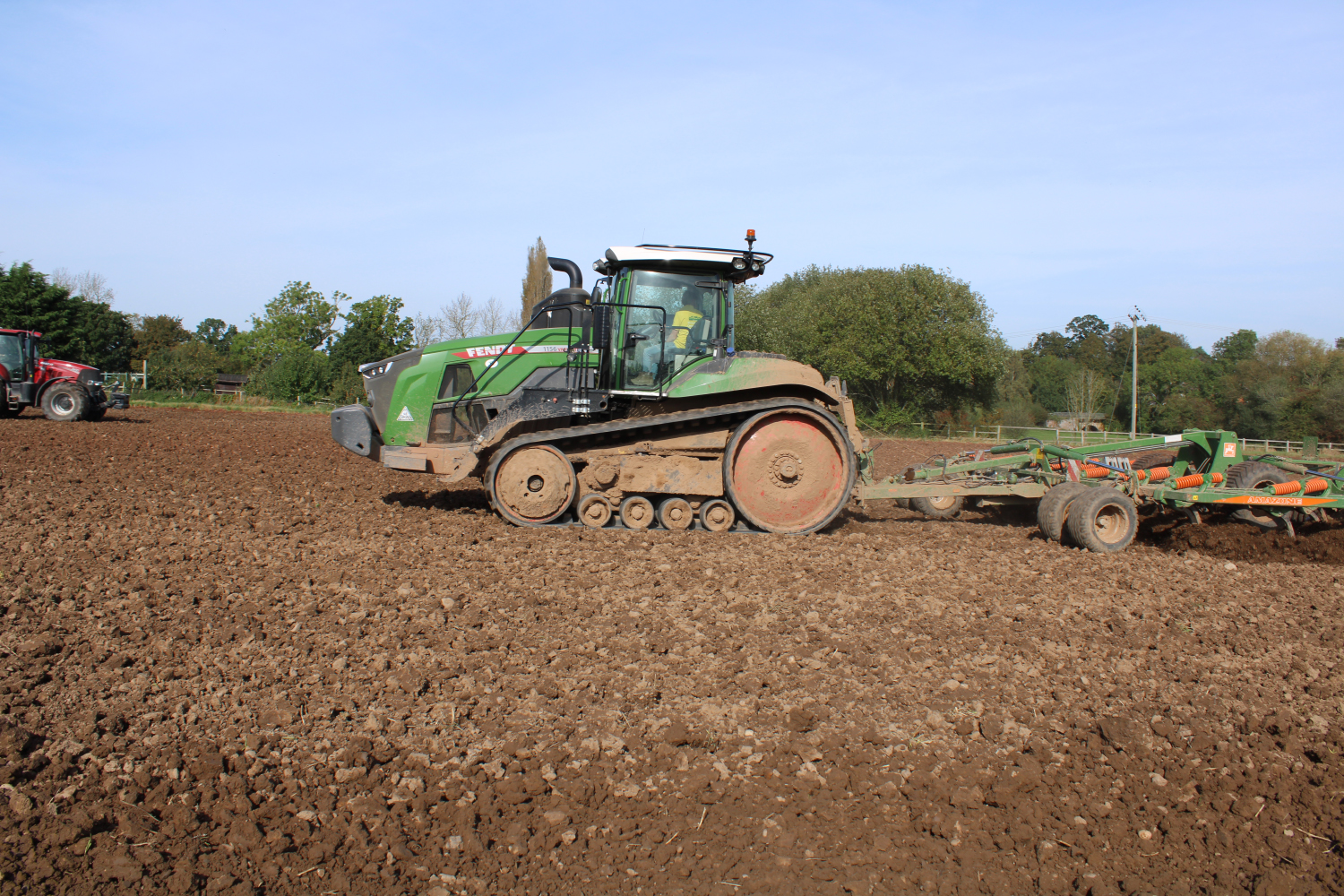
“All I have to do is set the forward speed and the tractor brings the revs down and settles in. I can go for hours and it will adjust for soil conditions automatically. I have been running an Amazone 7m cultivator at 4 inches and I am covering 10 hectares an hour,” says Mr Allison-Smith.
This, he suggests, is using just 80-90 litres fuel per hour, enabling him to use 8-9 litres of fuel per hectare with a forward speed of 15km/h.
“There is nothing else that compares, and the whole time it is quiet and comfortable in the cab. There is barely any noise and the engine doesn’t sound like it is trying,” he adds.
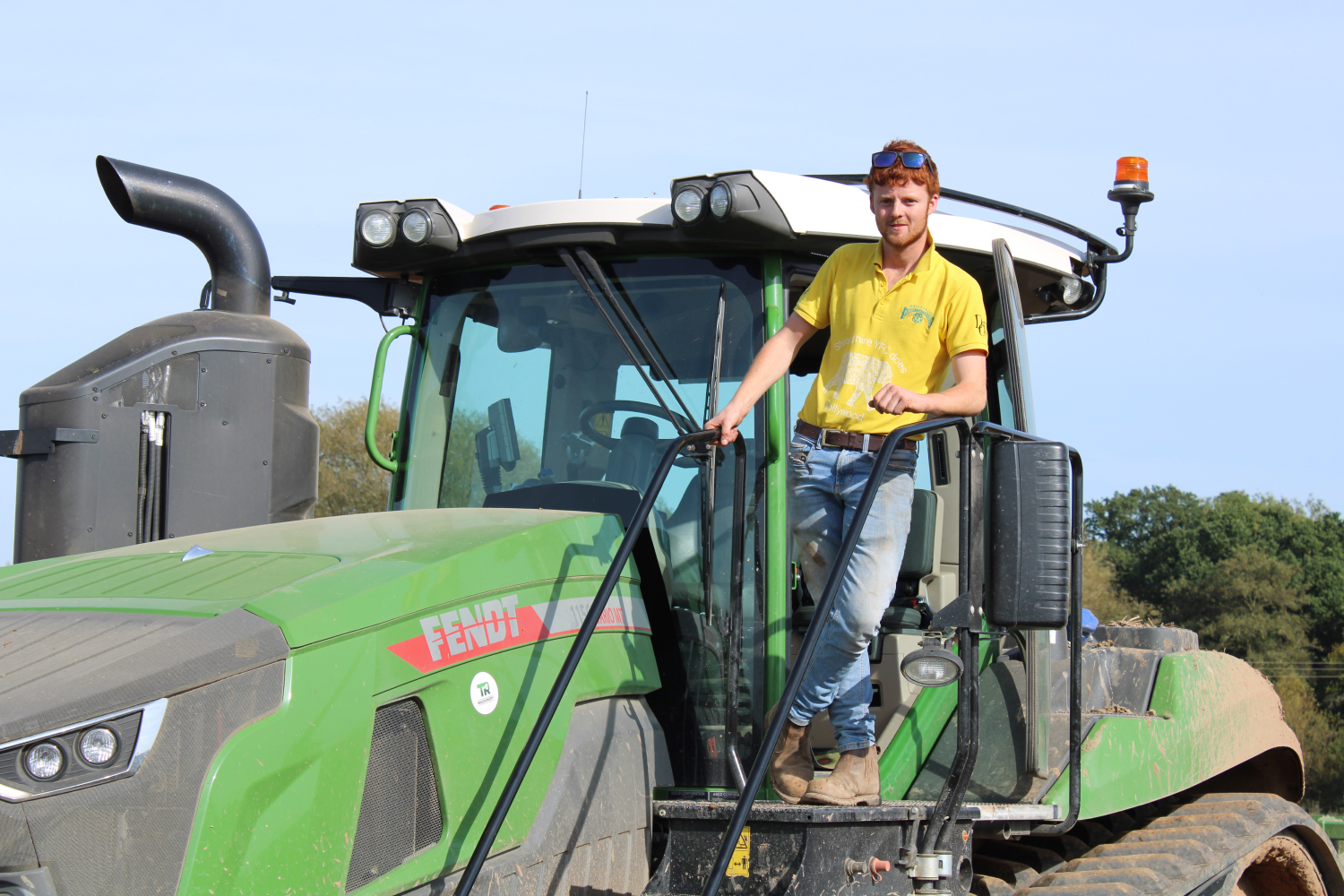
The farm grows predominantly cereal crops, with 300 acres of potatoes on rotation. Ploughing after potatoes or barley in heavy clay soils with a 7 furrow Gregoire Besson plough is considered light work for the big Fendt and it pulls through the soil at just 1100 rpm.
“I was ploughing at 6-8 inches through some tough ground and the fuel gauge barely moved during the day, it was as if the tractor didn’t even know the plough was there. The tractor management system (TMS) recognises changes in soil type too and I can hear the engine revs dipping when it moves into a sandy patch of soil,” he says.
Both men regularly do 12 to 14 hours shifts, making the cab an important consideration for them and Mr Walker as their employer. The Fendt operating system, is intuitive and ergonomic over long periods. However, the presets offer the greatest time savings and Mr Deane suggests that Fendt has combined simplicity with technology well.
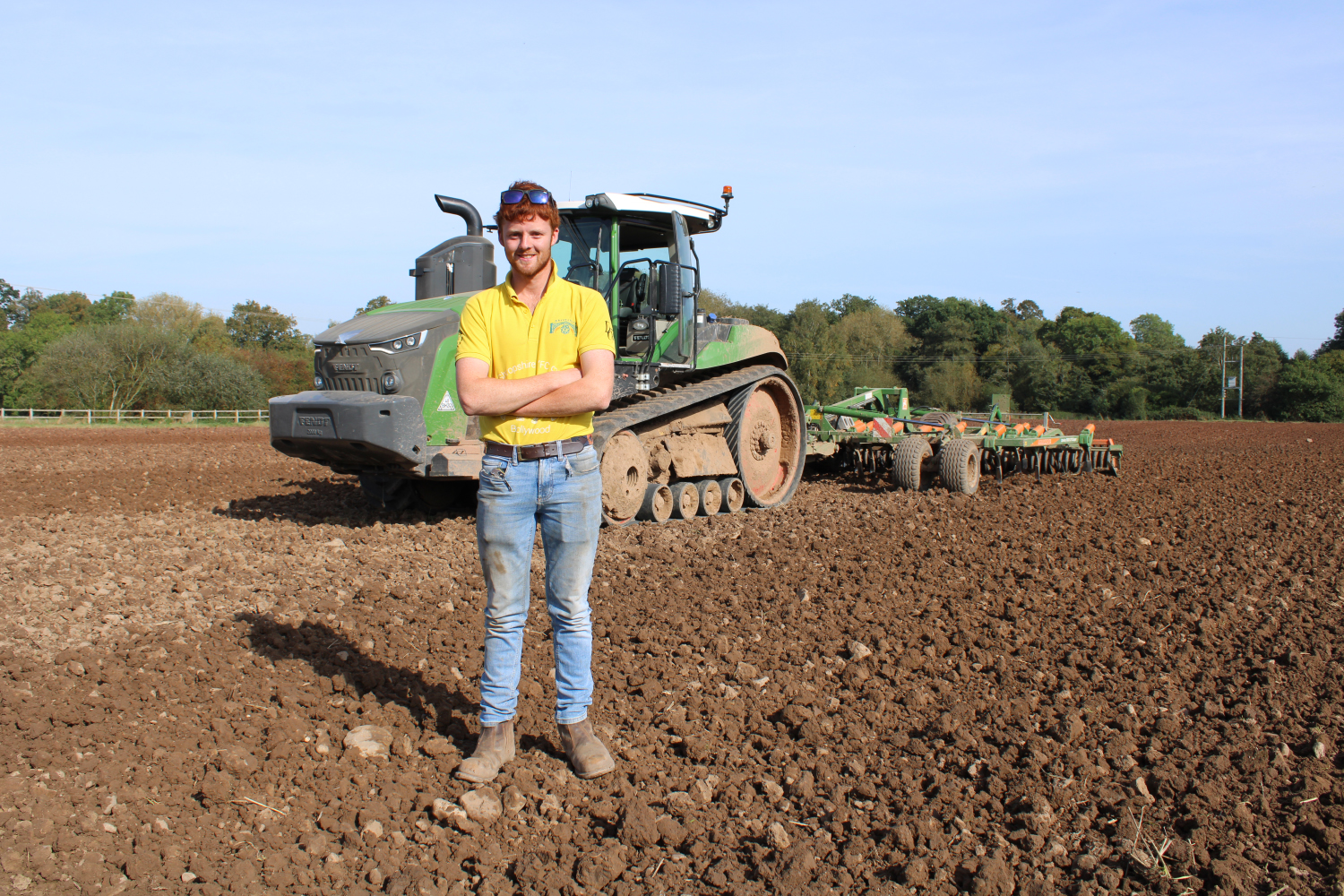
“I think the cab is pretty basic for a tractor like this, but it means you can get in it and just drive. The presets take a bit of time to set up initially but once programmed it is easy to select jobs. We are running RTK with our own base station and I can change implements by just clicking the correct implement and it brings all the settings from the last time it was used.”
The Fendt’s 10.4 inch Vario terminal continually displays all the important settings, the steering system or the attachment, but is also feeding information back to the office in real time. The FendtTaskDoc system is starting to provide the data needed to compare fuel use and the time needed to cover the ground each season, and soon the farm will have a wealth of data to make more informed decisions from.
Whilst the 1156 MT has only done 350 hours with the farm, it is already expected to do more than double that each year. Supplied by TR Machinery, it has only had one teething issue which was quickly dealt with by the dealer.
“It has been pretty faultless, and we have both got to know it well. TR Machinery managed to keep us going whilst our machine was repaired and since then it has just been getting on with any job we have thrown at it,” says Mr Deane.
Both men appreciate the Vario drive, suggesting that it can’t be stalled and that it offers a more measured approach to draft work without the need to constantly wrestle with a manual gearbox and over-revving an engine. The 1156 MT is also better suited to the road than some would expect.
“It is narrower than the previous Challenger models which makes it better for the lanes we travel on. It feels remarkably comfortable and quiet, and whilst we don’t cover long distances, the ride is far better than any other tracked machine.”
The tracks also extend to almost four metres of track on the ground which make it feel more planted, but with the advantage of minimising soil compaction. With ever shortening weather windows and higher rainfalls the Fendt enables the farm to cover the ground in a much greater spectrum of conditions.
Farm manager, Mr Walker concludes:
“Dan and Tom have to hit the land hard and fast. We have a system that works well and we have built up machinery that fits it. Whilst wheeled tractors have no doubt moved on, we have yet to find one capable of pulling cultivation like ours, and because they cover very few road miles, I believe that tracks are the only way to enable us to tackle our heavy land efficiently.”
Time saving for father and son
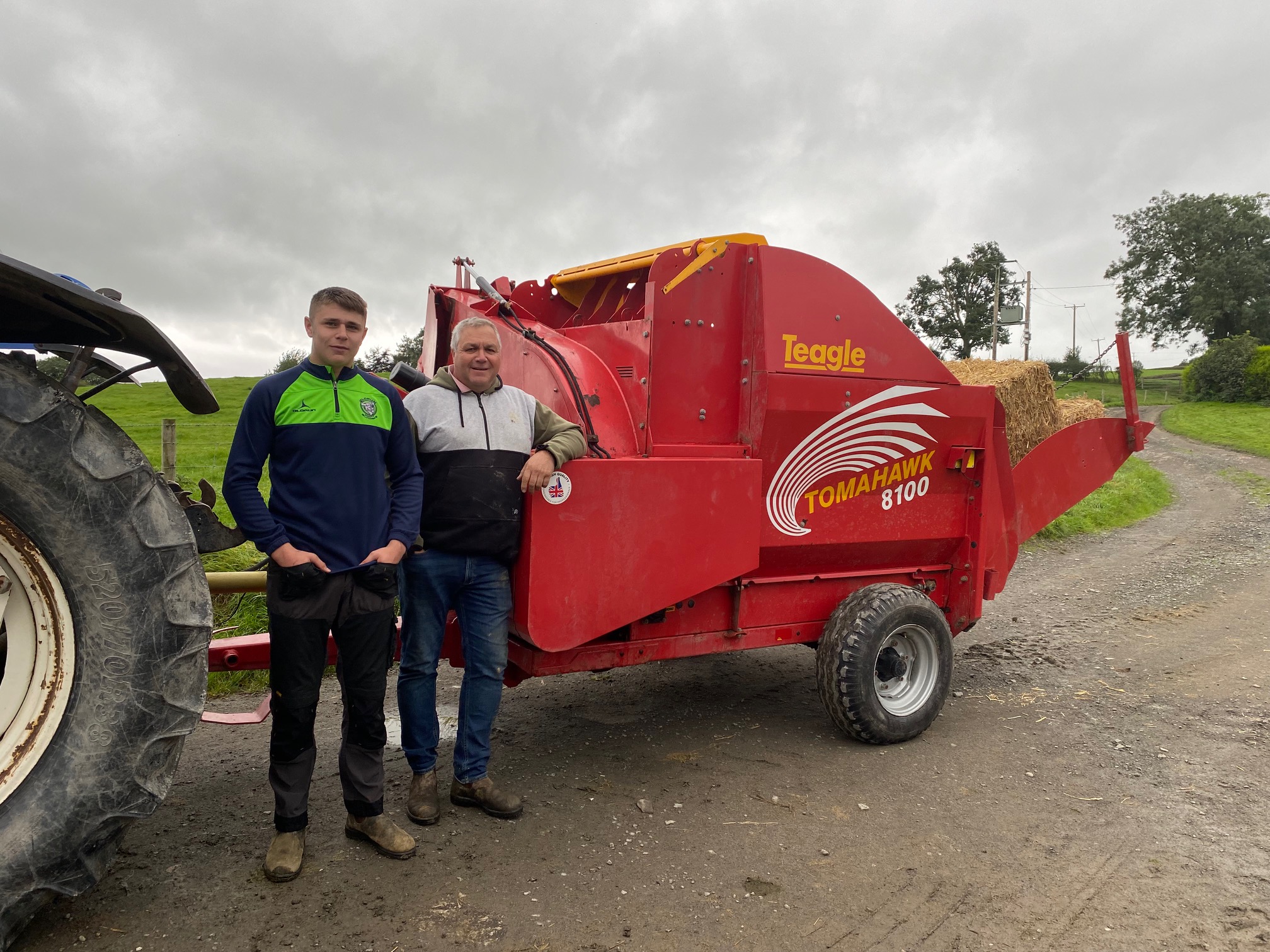
Gareth Davies and son Tom work on their mid-Wales family-owned livestock farm, rearing 1250 ewes, 50 commercial beef cows and 15 pedigree limousine cows. They also have a stock of 60,000 laying hens to look after on their 550 acre site.
With only Gareth, Tom and one other farm labourer, time is a major factor in livestock care and farm upkeep. Their Teagle Tomahawk 8100 saves them a lot of time in comparison with doing the same feeding and bedding by hand, especially in the winter months when the time saving could be over an hour a day.
The farm has a longstanding relationship with RVW Pugh, TR Machinery's sister company, with previous purchases being tractors, telehandlers and previous feeder bedders.
They decided to buy a feeder bedder in 2001 during the foot and mouth outbreak when they moved round bales and passage feeding. The machine can handle straw bedding, along with silage and bales. This is the third Teagle they’ve bought. The side shoot comes in very handy due to the way their sheds are designed, so a top shoot would not work.
Gareth added, ‘The Teagle Tomahawk 8100 is multifunctional, with the bedding and being able to reverse into silage if needed. You also get more out of a bale of straw because it is spread evenly and there are no clumps.’
Gareth hopes his business carries on the way it is at the moment going forward, and will continue his good relationship with RVW Pugh as he needs to update his farm machinery.
Three Generations, Two Wheels, One Love
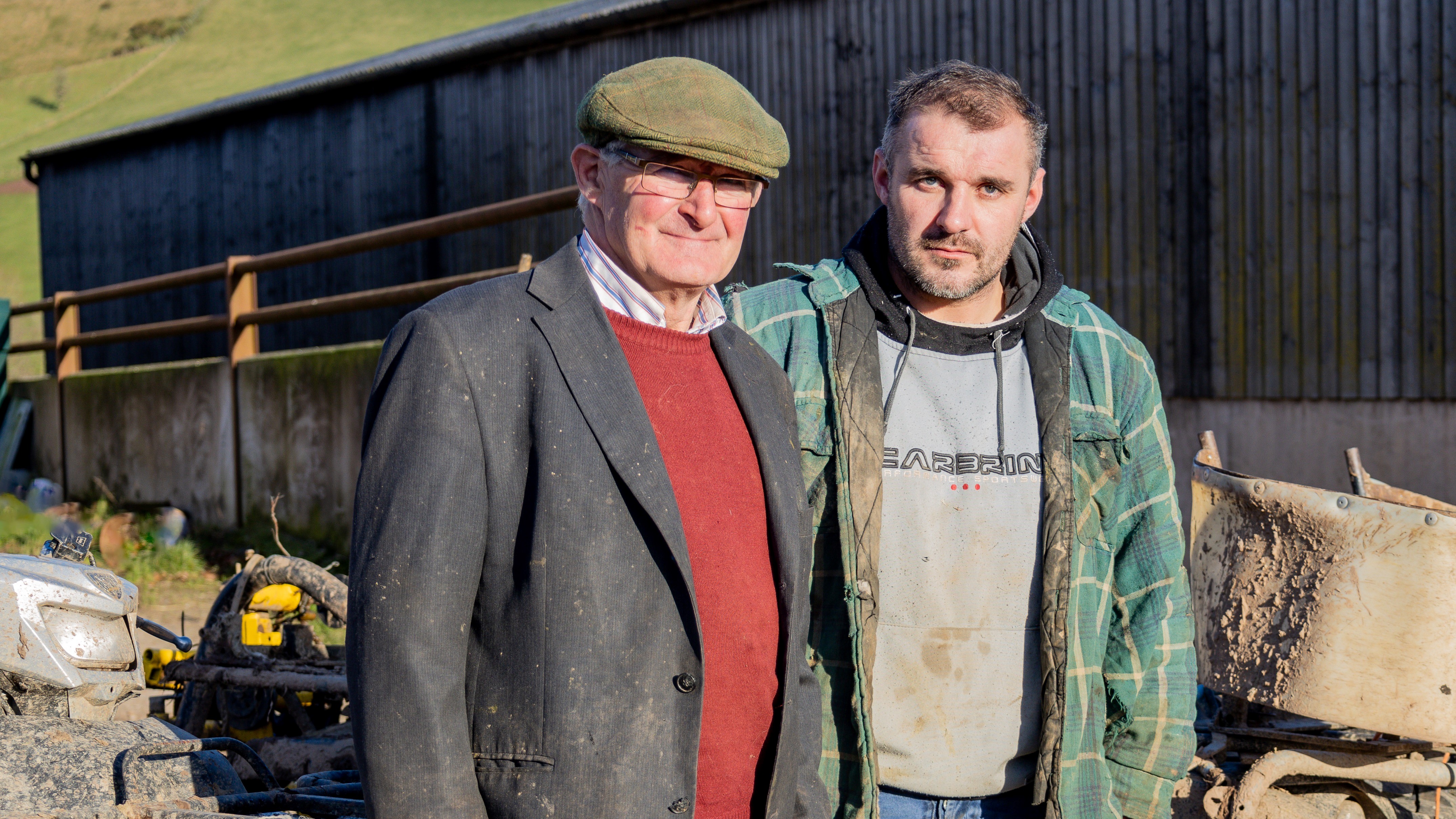
The Woods family have been long term customers of RVW Pugh, TR Machinery's sister company for their ATVs. They recently shared with Yamaha why they continue to choose their ATVs over other brands.
The Woods family, a family-run beef and sheep farm in Shropshire, have been using Yamaha ATVs for over 35 years to navigate the challenging hills of the Shropshire/Welsh border.
The Woods family run a beef and sheep farm located just a few miles from themarket town Bishops Castle in Shropshire. The farm spans 2800 acres and sits 820-1600 feet above sea level with plenty of hilly ground for them to tackle. Predominantly a beef and sheep farm, the family’s herd of 500 cattle and flock of 3500 ewes keeps this family very busy! Edith, her two sons Mike and Phil who have three sons between them; Tom, Martin and Simon, all work on the family enterprise. The family originally moved to Kinnerton Farm in Ratlinghope in 1962 and it has since remained a solely family-run operation.
Navigating the tumbling hills of the Shropshire/Welsh border can be a challenge, one that only their Yamaha ATVs can tackle. Purchasing their first Yamaha Big Bear ATVs in 1988 from local dealer RVW Pugh, the family have not looked back since and over the years have purchased over 25 Yamaha ATVs to help with the running of the farm.
“We tend to change them every couple of years and welcome three new bikes each time. We would be putting around 10,000 miles on each bike when it comes to changing them, so they are worked hard. Ultimately, they need to be able to tackle the rough terrain that we have here on the farm and that can take some doing! You cannot run across these banks with a 4X4 or even a side-by-side-buggy, these ATVs get you to more places and are safer in the process.” Phil Woods comments.
The three bikes that are at the farm are used extensively when moving animals which can be a daily task and largely for fencing work, lending themselves well to fitting equipment on the back as well as being able to get anywhere a tractor or 4X4 cannot.
“They are the workhorse on the farm, they need to be able to keep going. When they are used every day, the bikes are an essential piece of equipment, and we simply cannot manage without them!” Simon Woods comments.
Remaining a loyal Yamaha customer for over 30 years, the Woods family have seen plenty of developments in the range.
“We have always liked the Yamaha bikes, like with anything there have been niggles over the years that have been rectified, but never anything major and they continue to be a sturdy machine for us time and time again. We have tried other brands through friends and on other farms, but Yamaha remains our favourite for several reasons; we like the Diff-lock on the machines as it allows us to tackle the different terrains.”
Both the Kodiak 700 EPS and Grizzly 700 EPS models are fitted with an easy to-operate On-Command system with 2WD/4WD and Diff-lock for full control as well as allowing you to choose the right option to suit the terrain and surface conditions.
“The real stand-out feature for us has been the power steering. Robert Pugh convinced us to go with it, so we decided to have it on our latest bikes, and it is great. It’s a must now on any future bike, you don’t realise how good it is until you have to ride a bike without it. We love it!” Simon adds.
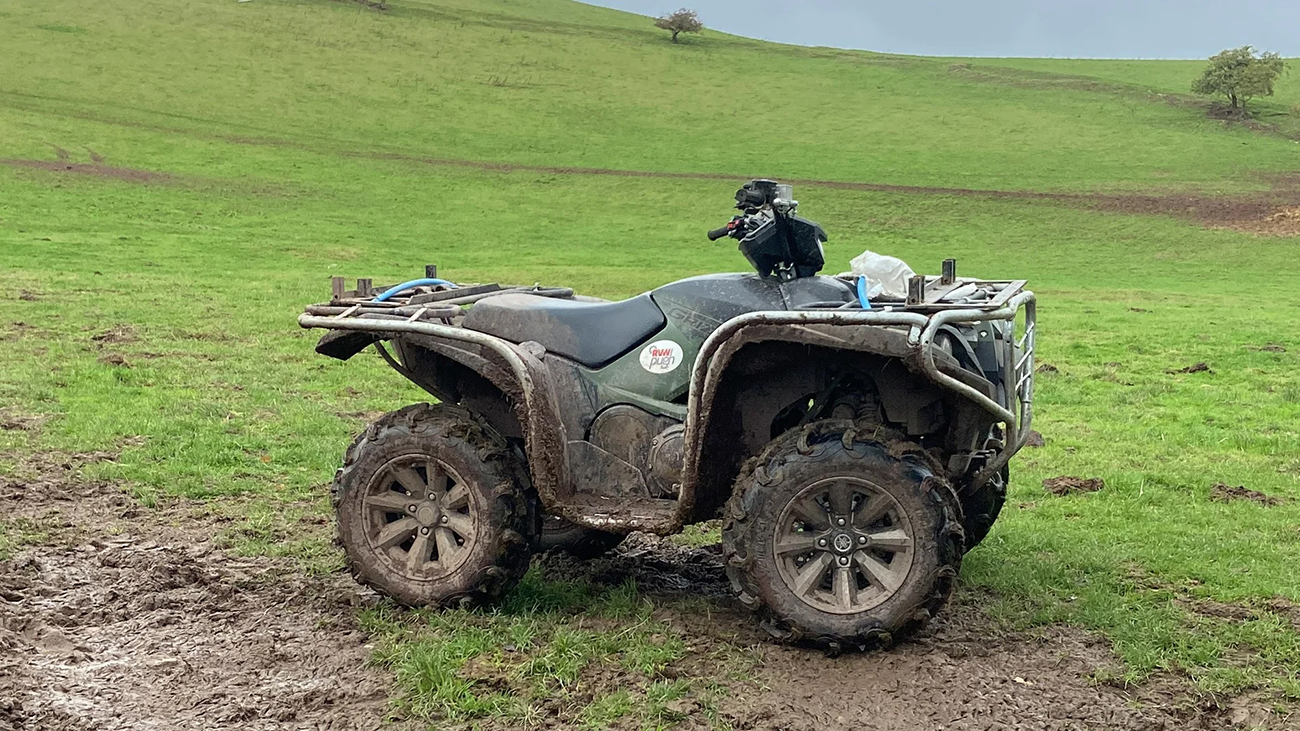
Yamaha’s Electric Power Steering (EPS) adds an element of extra comfort and a reduction in physical effort for the rider. By maintaining light steering and precise handling, this system enhances the complete experience and allows for better control.
Phil adds “All of our bikes come with winches which are handy to have in a sticky situation. We like to have the tow hitch on them as well although we don’t use it as much as we did in the past when we used a sheep snacker to feed. It’s also worth mentioning the design when riding the bike, they are comfy and all the buttons are to hand, making the driving a lot more enjoyable.”
Both ATV models that the Woods family owns allow a 600kg towing capacity which means fewer limitations when it comes to using the bikes on different applications. With another year of work ahead of the three bikes currently on the farm, the family will start to think about the models and features that are a must-have when it comes to swapping.
“We must have another Grizzly 700 as it is just that bit higher off the ground which we need when we are fencing especially. The equipment sits quite nicely on that bike and gives us plenty of clearance across the fields. The other feature we cannot be without is the power steering, I think those would be the only non-negotiables when it comes to changing these for our next set. We may even need four bikes next year, but we will see how we get on. Watch this space!”
Here’s to another 30 years of Yamaha on Kinnerton Farm.
Sulky Spreader is a great new addition for the Holloway’s Farm
Ed Holloway runs a 275 acre farm near Montgomery on the border of Wales and England. He is responsible for the day-to-day running of the farm from his dad, Mike.
The farm is mostly arable but also has some dairy cows that Ed and Mike rear on a contract with another local farm. Ed is the 3rd generation of the Holloway family that have farmed here, and took over from Mike around four years ago.
Ed required a new fertiliser spreader after his previous one had broken several times and it was more cost efficient to buy a new one, as they had also just taken on additional acreage. As a loyal customer of RVW Pugh, TR Machinery's sister company, Mike contacted sales Manager, Colin Harding to give advice on the best one to buy. Colin suggested a Sulky fertiliser spreader. Both Mike and Ed decided to buy a DX30+ model, which is the first Sulky machine they have bought, and found it very reasonably priced.
Ed said, ‘This was the first time we’d heard of the Sulky brand, but I feel we made a good choice of fertiliser spreader.’
The DX30+ model has a working width of 12-36m and has a capacity of up to 2700lt. It also has an optional weighing system with an automatic application rate adjustment from the cab.
Ed uses the Sulky app to calculate the amount of fertiliser needed per kilo per acre, where it gives him the settings needed. He uses a working width of 21m and has had no issues with the fertiliser spreader’s performance.
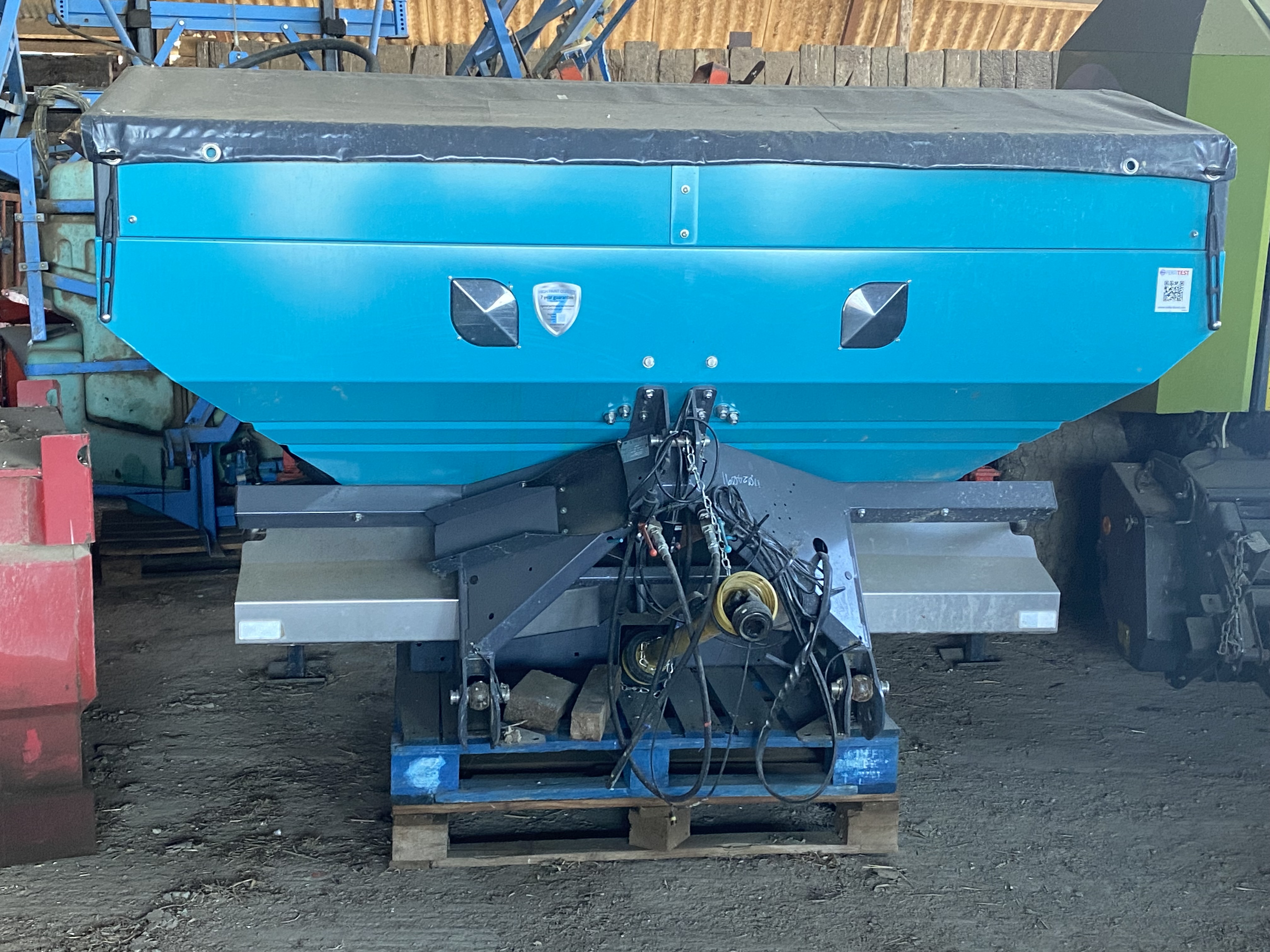
Ed added, ‘The spreader works well with a good even spread, and I haven’t found any patches where the crops are growing a different rates. Emptying after use is straightforward too.’
Ed’s hopes for his business moving forward are to carry on as they are and to continue to make a profit during uncertain times.
Although dad Mike did most of the buying process, Ed reported that there were no issues with RVW Pugh, and Colin helped to make it a smooth transaction.
The Holloways currently run two Massey Ferguson tractors, so Ed will probably look to buy a newer model in the next 2-3 years, and will probably buy a new power harrow soon.
Four counties farmer is a Fendt fan!
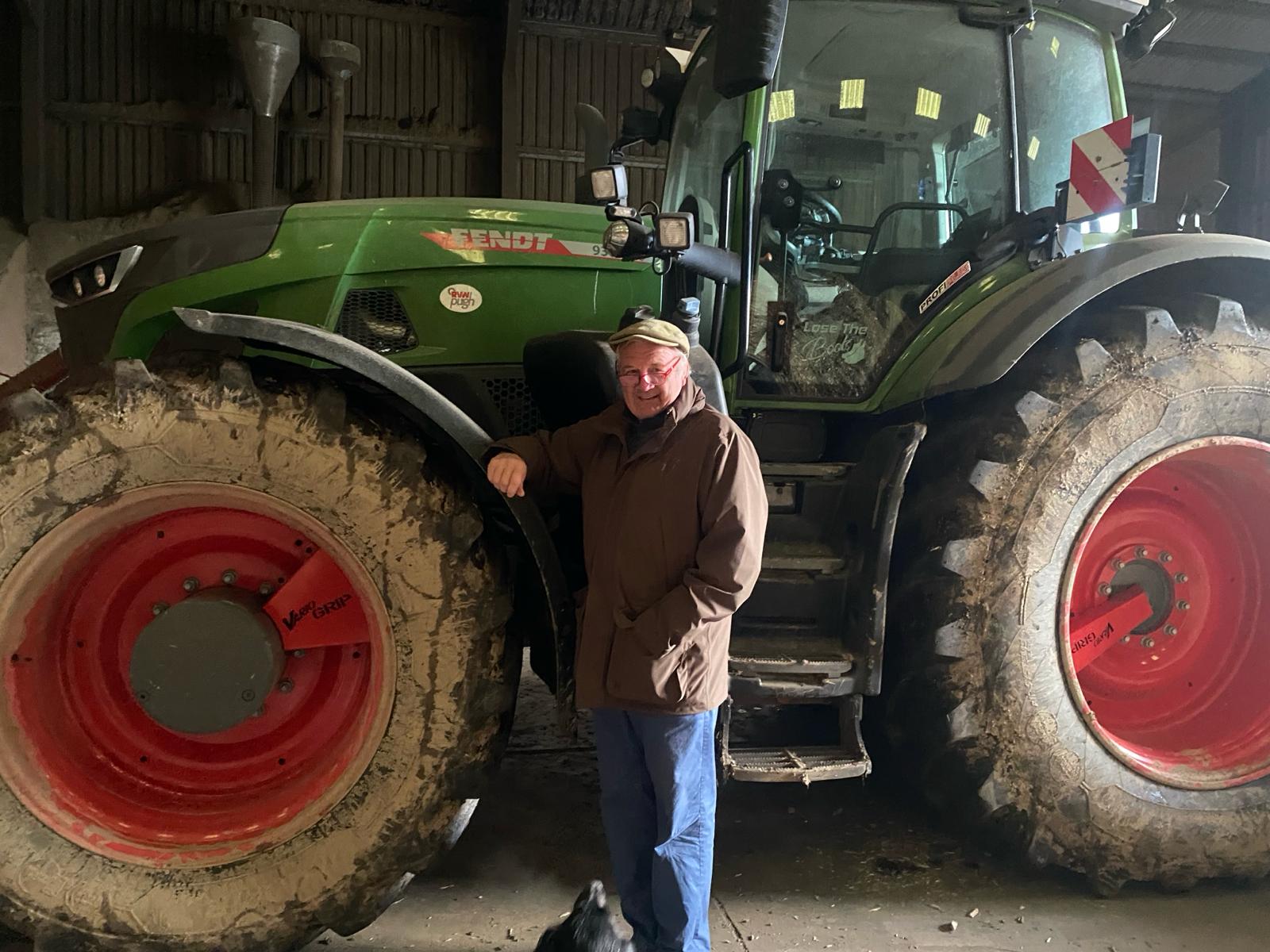
Peter Vaughan is a second generation livestock and arable farmer who lives near Kingsland in Herefordshire. His father started farming there sixty years ago, and was a Doctor's son. Peter and his six workers manage sheep, cattle, chickens, corn and potatoes across his land that spans over four counties.
Due to the amount of travelling Peter and his workers do, he decided to purchase a Fendt 936 because of its speed ad ability to get to his land. Peter said, "The 936 is the best tractor we've ever had on the farm, it has a very good engine and the workers adore it! We changed from a Fendt 939 as the Fendt 936 is a slightly smaller tractor but its has a long torque base so it suits our needs better."
Peter runs several tractors, including John Deere, Massey Ferguson and several Fendts. He was also one of the first farmer to buy a Fendt Vario. He also added that the Fendt 936 is very good on fuel efficiency and can run at 1500 rpm all dat at full power. Peter also likes the variable pressure tyres, Variogrip.
The Fendt 936 is used with a 3 row bed tiller during potato season, utilising the 350-400 horsepower very well. It is also used for drilling corn in the autumn.
Peter has been a long term customer of TR Machinery and its sister companu RVW Pugh. As a result, he feels that the company as a whole is very good and very happy with the sales and aftercare service that he recieves. Peter's son has just bought a potato lifter and Peter is looking to increase his fleet of tractors with a Fendt 728 in the coming months.
More features that the Fendt 900 series tractors boast are the iD low-speed concept, enabling reaching the highest torque at low speeds and permantly low fuel consumption. There is also an option to have up to three screens, colour coding for different function groups and a 3L joystick with reverse button. It also has a self cleaning air filter that is blown out whilst driving and reduces rolling when cornering which means increased safety and improved ride comfort.
Turfs Up with Two New Fendt 211 Tractors
Wrekin Turf is a 35 year old family business that employs 5 people on its 150 acre farm. Turf is grown and supplied to domestic and commercial customers in and around Shropshire.
There first purchase from TR Machinery was two new Fendt 211 tractors that they find comfortable and easy to drive. Mark from Wrekin Turf said, "There's more technology on the Fendt 211s than other tractors we have had, and they are easy to drive."
Mark has found the cab of the Fendt 211 comfortable and a nice workspace to be in. The cruise control option has also come in handy on the turf farm and the Vario transmission is a great option.
Mark added, "In comparison to the other tractors we run, the Fendt is a great and easy drive." He also mentioned that he noticed the fuel efficiency was very good with an average of 3.8L an hour when using the turf harvester.
On his dealings with TR Machinery as a whole, Mark has found the experience very good, not only on the sales side, but with the servicing too. He particularly mentioned Sam from TR servicing was great, very friendly and as soon as he's called, Sam is on his way!
Marks hopes for the future are to grow his business and increase his customer base.
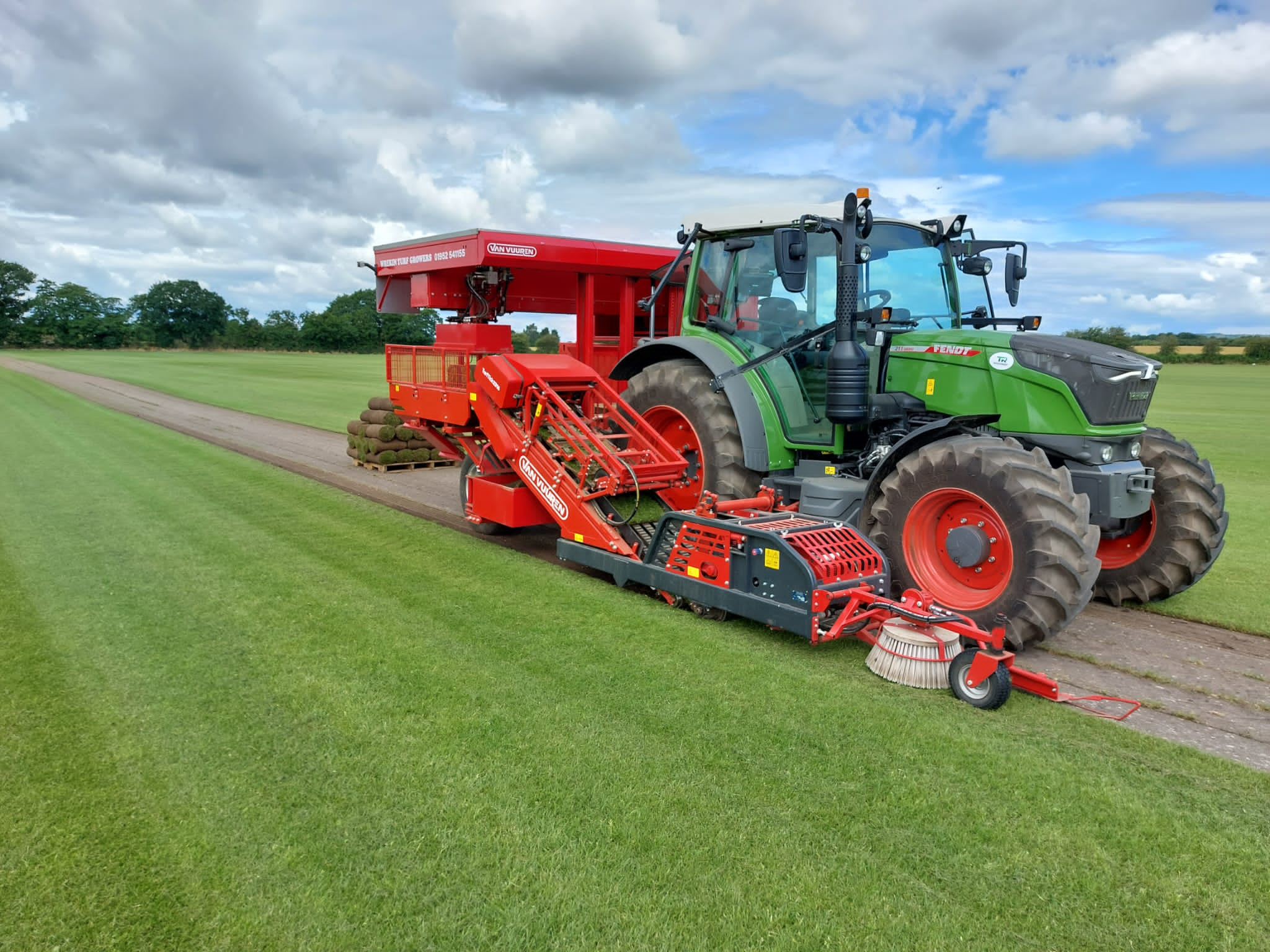
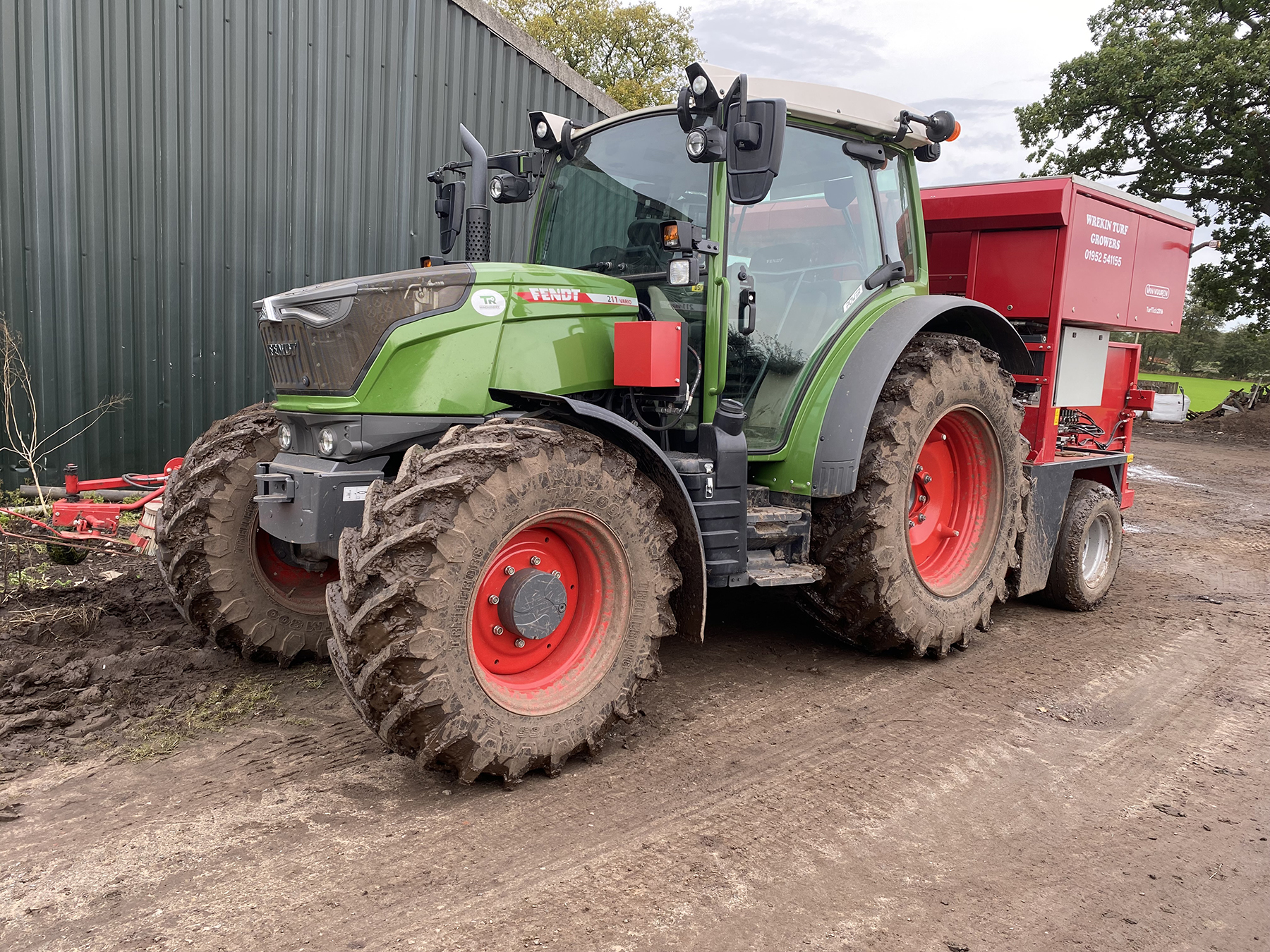
_1.jpeg)
Fendt 720
Harry Upton from B W Upton & Sons, Ellerdine Hall Farm, tells us all about their Fendt fleet and why they wouldn't hesitate to recommend Fendt to others.
What sort of farming do you do? We do contracting and arable with our own farm. We contract more than we do own, which works out to be easier for us. In the winter it does go quiet but we do all maintance in house.
How many Fendt Tractors do you own? We own two 828s and three 720s.
What do you like the most about these tractors? All in all we really like the comfort and the speed, and once you're used to them they're really user friendly.
Would you recommend a Fendt tractor to others? Yes definitely, not a lot of other things I'd be happy to be in all day. 100 hours a week this time of year. They also consume 100 litres a day less than a New Holland so the fuel savings are great in comparison.
Fendt Gen 6 724 Profi Plus with FendtOne operating system
A TR Machinery Customer has ceased pig production to concentrate on using regenerative techniques to improve soil health and grow more broad acre crops. To achieve this, they have invested in a Fendt Gen 6 724 Profi Plus with the new FendtONE operating system.
Farm manager, Harry Heath states that there is so much data available in farming, but so little is used to its full potential. "We have been collecting data to use our machines more efficiently and effectively and that is where Fendt has excelled."
With 5 screens in the farm office, it is evident that Mr Heath had transitioned to a different style of farm management. "In the past it has been hard to convert data from field maps to real farming insight. However, embracing the new Fendt operating system has improved operations in the field and in the office. I initially resisted using the manufacturer software for more than just operating the tractor, but I have realised that much like using iOS with an Apple iphone it is designed to work better when fully intergrated," he says.
Following a shift to a no-till system for much of the farm, he has been able to implement a methodology similar to controlled traffic. The farm grows wheat, barley, rye, sunflowers, OSR, beans and oats as as intercrop. Mr Heath explains that the sandy loam soils have improved significantly since the farm moved to a more rigid tramline system. "We still have limitations because not all our kit will run in the same lines, but in time we can improve this. The only part of rotation where cultivation is still used is discing in front of the OSR."
With Fendt's VarioGuide Contour Assistant and Variotonic TI headland management he has mapped and progammed the 724 to work autonomously. "We have awkward shaped fields, but once the tractor has mapped them, every subsequent visit is easy. It's like any software, you have to set it up, but once it's working it makes life so much easier.
The headland management system system from Fendt makes it possible to record procedures that are used frequently and repeat them with a push of a button. This saves time at the headlands and prevents possible operator errors of long days. "We contract farm an additional 100 hectares and for the operators it is a real help to map an unfamiliar field just once, so that on second visit they can rely on the tractor to remember. It also reduces fatigue which is something that Fendt has always been a market leader in for me. The tractors are comfortable and with the technology it enables the operator to focus on the task, rather than grapple the machine."
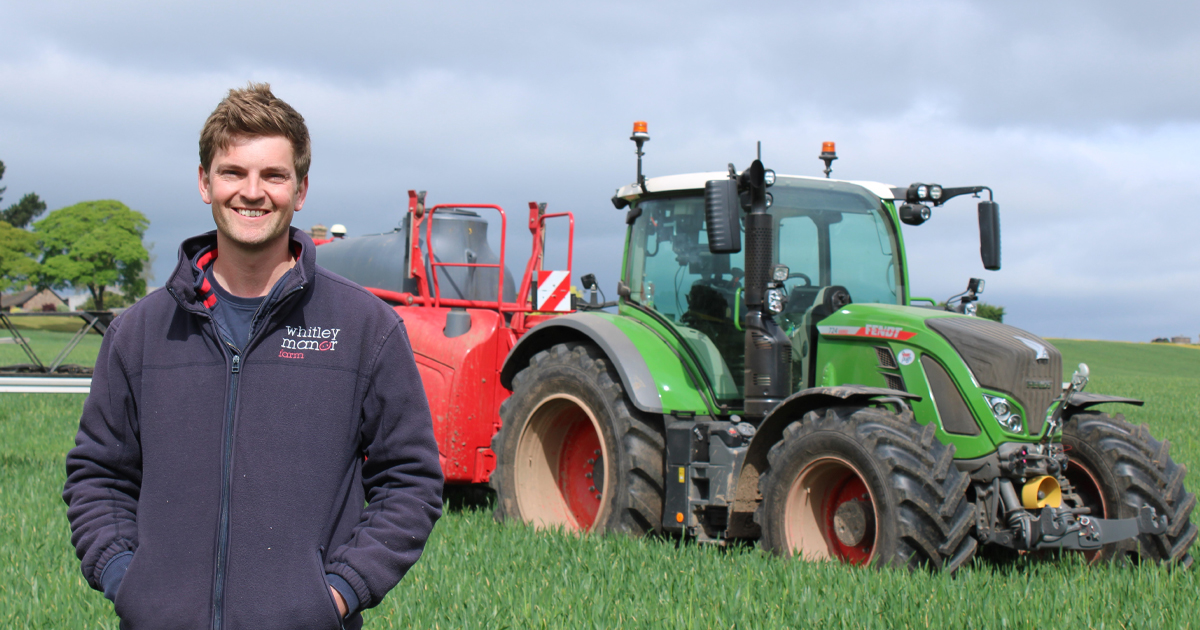
Technology aside, the Fendt performs beyond what would be expected of a mid-horsepower machine. Mr Heath suggests the power to weight ratio is much better than other tractors in the bracket and that the relatively light 724 is also better for the soil. " We are looking to reduce compaction and lighter machines certainly help with this."
Future expansion
To make full use of the machinery investment, Mr Heath is expanding the contracting arm of the business. He argues that with the price of machinery rising, that machines need to cover more land to be viable. "We bought a Fendt 820 in 2009 for £74,000 and this latest 724 was £158,000. I dont begrudge the investment, but to realise the best return it makes sense to take on more work." By using the tractor to its full potential and not having a machine that is too powerful, he has seen significant reduction in fuel consumption. "It's well known that Fendts are fuel effecient, but this latest Gen 6 is the best we have had, and it couldn't have come at a better time because red diesel prices are rising sharply. Since we moved to a no-till system we have seen a ten-fold decrease in our establishment fuel costs because we are able to operate with smaller tractors and use implements that require less pulling power.
His ultimate goal is to regenerate the farm's soil. A blend of more efficient machinery, soil sample data, farm management software, FendtOne, and the move to min-till is showing encouraging results and has bought him greater flexibility. "We can react to extremes in climate more easily and I feel more incontrol with the data that I can see from the tractor and the agronomic work we have invested in. It is great to see the worm count increasing and I feel that we have turned a corner that will see the farm be both more productive and more sustainable in the future," he concludes.
Fendt 313 & 513 and Rolland Feeders
Dan Lovett from Oldford Farm in Staffordshire tells us all about his Fendt 313 & 513 tractors and his Rolland Rollfeed 6222 set up.
Livestock/arable farm? Acres? Location?
Here at Oldford Farm, we milk 1000 Jersey cross Fresian cows where we operate on a grass-based system. The cows peak at an average of 6,000 litres. We only grow fodder beat and grass for grazing and silage.
Have you always used Rolland Feeders and did you try any competitive brands before purchasing the Rolland Feeder?
We’ve had Rolland Feeders here for about 5-6 years but before then we had Richard Western Feeders. I was always looking for something more like the New Zealand feeders, and there’s nothing like it on the market, the Rolland feeders are the closest thing out there to it. They are a very good machine and for what we want here at Oldford Farm it is brilliant. It’s a one machine operation; we use the Fendt 313 with a loader to fill and also feed the cattle, this allows us to keep the capital down and also cut down on diesel usage which is very important to me.
What did you like best about the Rolland Feeders and how do you find the build quality?
I would say the best thing is that it does exactly what we want it to do here at the farm and more than anything it doesn’t wear metal. We’ve been very lucky with the Rolland feeders, it’s nevermissed a feeding and I’d say it does roughly 10,000 feeds a year. I would also say it is a light machine and when we need to take it into the field it doesn’t mark the ground.
How have you found the process of dealing with us, your local dealer ? I'm very happy with the service we get . The team are always on the other end of the phone and always very reliable. If we do have a breakdown or a problem, they’re here as soon as they can and work to sort it out.
I hear you’ve got a few Fendt tractors, have you always been Fendt?
No, we haven’t, we did have John Deere before and also had a Valtra but we’re very happy with the Fendt and wouldn’t look back. We haven’t had a big problem (touch wood) and when we do have a question or little issue it’s sorted straight away – they offer great backup.
We’ve currently got the Fendt 313 and 513. The 313 is a very handy tractor fitted with a loader, it does the filling job and also the feeding which makes it a one tractor operation. Then we use the 513 for the fertiliser spreading and livestock haulage. I must add I do like the short wheelbase.
How often are you using your Fendt tractors (hours per year?)
I would say we use the Fendt 313 around 2000 hours a year doing all the feeding while we use the 513 between 2000 and 2500 hours a year between various jobs.

Fendt 828

While they took a break from combining, due to the weather, we took the opportunity to catch up with Harry Upton from BW Upton & Sons Agricultural Contractors to have a chat about the Fendt 828 they brought at the end of last year.
BW Upton & Sons Agricultural Contractors has always been a family run business, it originally started as a dairy farm in Ellerdine, Shropshire over 70 years ago by Harry’s Great Grandad, it is now the home of their contracting business, after selling the cows in 2000. Many members of the family work within the business working on around 1000 acres of arable land.
Their Fendt 828 is primarily used for drilling and cultivation but due to the machines capability it is used for a little bit of everything from drilling to carting. This is one of the reasons the 828 appealed to Harry, the 900 series models were too big for what he was looking for compared to the horsepower in the 828 which was perfect.
Whilst talking about different aspects of the tractor Harry explained ‘due to spending a lot of the day in the cab I wanted a tractor with plenty of space whilst also being comfortable to operate. The Fendt 828 offered both of these features which was one reason this model appealed to me over others’. On the topic of the features on this tractor Harry spoke about the Vario Grip he has on this machine. The Vario Grip is an optional extra but he explained that it allows him to work in fields with out getting stuck and needing assistance. The Vario Grip reduces the risks of churning up fields, being important whilst working on other people’s land.
This is the first time Harry has bought a Fendt and explained that it was one the easiest deals he had ever done!
Black Edition Fendt 724
Swinnerton’s Contracting was started by the Swinnerton family over 15 years ago after the sale of their family farm. Originally, starting out using New Holland tractors they moved towards John Deere and are now using a selection of Fendt machines alongside their John Deere, after having one on demo and falling in love with it. There most recent Fendt purchase being the Black Edition 724.
We caught up with Mike Swinnerton to chat about his new 724 to find out his views on this machine.
When asked about why he chose the 724 over the other models, Mike explained ‘the three main things that swayed my decision were the comfort, control and driveability’ In regard to comfort Mike explained that he could feel the quality of the seating and machine whilst driving it whether on the road or in the field making it an overall better experience. In addition to comfort, the driveability of the machine was a big factor, Mike believed that the Fendt 724 drove a lot better than other machines he had driven before.
At Swinnerton’s the 724 is used for a variety of different jobs, using a variety of different implements, from mowing to drilling to ploughing. Its size and horse power, which was said to be the perfect amount at 237, allows it to be versatile and reliable when doing a multitude of different jobs in different conditions. One of the features on the 724 in relation to the versatility that Mike mentioned was the steering lock, he explained that the steering lock allowed them to undertake work that require tighter turning allowing it to get to places other tractors may not be able to first try or at all.
Talking more about the features on the 724 Mike spoke about the lift capacity of the machine. This machine has great lift capacity for its size, Mike compared it to the John Deere they currently have saying that the John Deere lift capacity is nothing compared to the Fendt’s.
Finally, we spoke to Mike about his experience with us, his local dealer. He only had positive things to say about the sales team and the customer service he received with this machine as well as with the ones he has purchased in the past.


.JPG)
.JPG)
